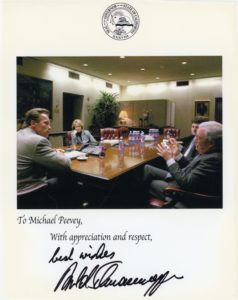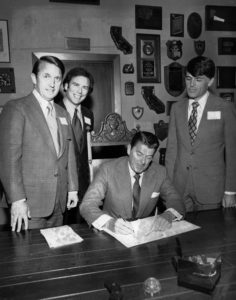New Transcript Release: Michael R. Peevey

A key theme throughout Michael R. Peevey’s life, which he narrates in this extensive oral history, has been establishing a balance between economic dynamism and environmental harmony.

In the 2000s, as President of the California Public Utilities Commission and lead regulator of California’s vast energy industry, Peevey combated climate change with policies that incentivized the state’s transition to renewable energy. In the late 1990s, his own incredibly successful start-up company, New Energy Ventures, offered such efficiencies in electricity use and cost that it secured contracts from major companies and organizations, including all US military installations across California. In the late 1980s and early 1990s, while president of the Southern California Edison utility company, Peevey spearheaded efforts for electric vehicles. And in the 1970s, Peevey balanced economy and environment by co-founding and directing a new political advocacy organization called the California Council on Environment and Economic Balance (CCEEB), made up of labor organizations, powerful corporations, and environmentalists.
Michael R. Peevey was born in New York City in 1938 and moved to San Francisco in 1944. After earning his Bachelor’s and Master’s degrees in Labor Economics from the University of California, Berkeley in 1959 and 1961, respectively, Peevey helped pioneer President John F. Kennedy’s New Frontier at the US Department of Labor. Peevey returned to California in 1963 to become research director of the California Labor Federation.

In 1973, shortly after creation of the California Coastal Commission, Peevey co-founded and became executive director of the California Council on Environment and Economic Balance (CCEEB), which was chaired by former California Governor Pat Brown. Peevey later helped establish similar institutions to balance environmental improvement with economic opportunity, including the California Foundation for Environment and Economy (CFEE), CALSTART, the Pacific Forest and Watershed Lands Stewardship Council, and the California Clean Energy Fund.
Peevey became deeply involved in California’s energy sectors. In 1984, Peevey joined the Southern California Edison utility company, where he quickly rose to become president of both Edison International and Southern California Edison before departing in 1993. In 1995, amid deregulation of California’s energy economy, Peevey co-founded New Energy Ventures (now NewEnergy, Inc.), which rapidly rose from zero to $600 million in annual sales. Peevey and his co-founders sold New Energy to AES in 1999.

In 2001, amid skyrocketing electricity costs and rolling brown-outs, Governor Grey Davis requested Peevey come to Sacramento to help mitigate the California energy crisis. In 2002, after Peevey helped control the crisis, Governor Davis appointed him as president of the California Public Utilities Commission (CPUC). Both ensuing California Governors Arnold Schwarzenegger and Jerry Brown reappointed Peevey as CPUC president before Peevey’s retirement in late 2014. In 2017, Peevey co-authored the book California Goes Green: A Roadmap to Climate Leadership, which further details ways that California has pioneered paths toward environmental sustainability while maintaining its astounding economic dynamism.
In this oral history, Peevey discusses all the above events, as well as the following topics: his family background and upbringing; education at UC Berkeley; work in labor organizations; running for elected office; political advocacy on environmental issues; reflections on political and executive leadership; his career at Southern California Edison; market deregulation and entrepreneurship; the California energy crisis in the early 2000s; leadership of the California Public Utilities Commission; and policies he championed to incentivize California’s green-energy economy.